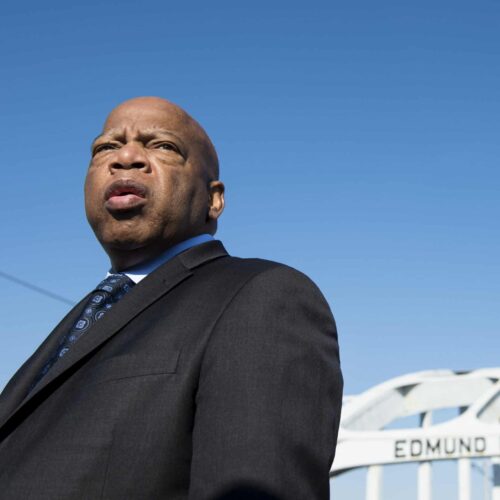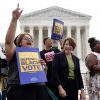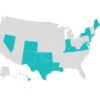Introduction
When the U.S. Supreme Court decided an important voting rights case earlier this year, its ruling made it more difficult for voters to challenge restrictive state voting laws.
Now, the state of Texas is making an argument that, if adopted, would further hobble use of what remains of the Voting Rights Act.
In a brief filed in a redistricting case last month, lawyers for Texas argued it isn’t clear that Section 2 of the Voting Rights Act allows private challenges to state laws at all, an argument that flies in the face of how the landmark civil rights-era statute has been interpreted by federal courts for decades. The state made the same argument in a case over its new voting law.
Such a scenario sounds far-fetched, but Texas’ lawyers aren’t raising the issue out of nowhere.
In a one-paragraph concurring opinion in Brnovich v. Democratic National Committee, the voting rights case decided last summer, Supreme Court Justice Neil Gorsuch said the court’s previous cases assumed that private parties had the right to bring lawsuits challenging state election laws under Section 2 of the VRA, but it was an “open question” the Supreme Court had not yet decided. Justice Clarence Thomas was the only other member to sign on to Gorsuch’s concurrence.
“If it hadn’t been for the Gorsuch line in Brnovich, I would have thought it was kind of a crazy argument,” said Ruth Greenwood, director of the Election Law Clinic at Harvard Law School, of the Texas brief.
Battle-weary voting rights experts described Texas’ argument as a long shot without clear support from a majority on the Supreme Court. Nonetheless, they said the argument fits into a pattern of attempts designed to restrict the reach and utility of the voting rights law, and must be viewed in the context of recent court decisions unfavorable to voting rights. And, they say, it illustrates again why Congress must pass new federal legislation on voting rights.
“It is, unfortunately, a Hail Mary pass in a world where people are more receptive to Hail Mary passes,” said Michael Li, a senior counsel at the nonprofit Brennan Center for Justice. But “you have to take everything very seriously because even not very good claims get taken seriously sometimes.”
Good claim or not, on Tuesday, the U.S. Department of Justice made it clear it’s taking the potential threat to Section 2 seriously, filing a 20-page statement of interest pushing back on the state’s argument. DOJ filed a similar statement in the Texas voting case in November. DOJ said the case presented “important questions” regarding enforcement of Section 2 of the VRA and it has a “substantial interest in ensuring proper interpretation of this provision.”
A shot across the bow
In 2013, the U.S. Supreme Court struck down a central requirement of the Voting Rights Act. Its ruling in Shelby County v. Holder meant places with a history of racial discrimination in voting no longer had to seek federal approval before making changes to voting laws and procedures. But the case didn’t affect Section 2 of the VRA, which allows litigation after the fact and applies to the entire country.
“Section 2 is permanent, applies nationwide, and is not at issue in this case,” Chief Justice John Roberts Jr. wrote in the Shelby County decision. Nonetheless, earlier this year, the Supreme Court used the Brnovich ruling to lay out a high bar for considering challenges to state voting laws brought under Section 2.
That’s the case that included the Gorsuch concurrence — and Texas’ lawyers weren’t the only ones to notice it.
In the wake of the rulings, Democrats, who hold slim majorities in both houses of Congress, have repeatedly said voting rights are one of their top legislative priorities, including legislation crafted to address the recent rulings while restoring and updating the Voting Rights Act.
The legislation, named for the late Rep. John Lewis, includes language responding to Gorsuch’s concurrence by explicitly spelling out the right of private plaintiffs to sue under Section 2, rather than leaving it implicit.
Gorsuch’s assertion that there may not already be a private right of action in Section 2 is “plainly incorrect,” said an analysis of the bill published by the office of U.S. Sen. Patrick Leahy of Vermont, the Lewis legislation’s sponsor, calling the justice’s concurrence “an enormous shot across the bow.”
The bill’s prospects are uncertain. Voting rights legislation has historically won bipartisan support, but Senate Republicans blocked consideration of the bill last month; only one GOP member, U.S. Sen. Lisa Murkowski of Alaska, voted in favor of opening debate. A separate sweeping legislative package that would set new national standards for voting laws has also stalled in the face of unified Republican opposition.
‘Death by a thousand cuts’
Texas’ brief was filed in a case about the state’s redistricting process brought by a coalition of Latino groups; a federal judge subsequently consolidated the case with others. The office of Texas Attorney General Ken Paxton did not respond to a request for comment.
The argument over whether private actors can sue comes as states face lawsuits making Section 2 claims over redistricting, the once-every-decade redrawing of political district lines that helps determine political power.
“We’re sure we’re going to see similar arguments cropping up in the cases in other states on the redistricting front, kind of teeing up this issue,” said Sophia Lin Lakin, deputy director of the ACLU’s Voting Rights Project.
The state’s argument is “clearly a desperate move,” said Thomas Saenz, president and general counsel of the Mexican American Legal Defense and Educational Fund, or MALDEF, which is representing the plaintiffs.
“I consider it after 50 years highly unlikely that even a conservative Supreme Court would conclude at this point that there is no cause of action under Section 2,” Saenz said. After all, he points out, if Congress didn’t intend to create a private cause of action, it could have addressed the issue when revisiting and reauthorizing the Voting Rights Act over the decades.
Other voting rights experts agree with him, though they’re wary. Jonathan Diaz, a senior legal counsel for voting rights at the Campaign Legal Center, a nonprofit that brings voting rights cases, described it as “definitely cause for concern that Justice Gorsuch seems to be inviting this idea,” but said he is “skeptical that even this court would go so far as to say there’s no private right of action. Rick Hasen, an election law expert who is co-director of the Fair Elections and Free Speech Center at the University of California, Irvine, also said he was skeptical, but added that “these days anything is possible. And if the only Section 2 suits could be brought by DOJ, then certainly there would be many fewer Section 2 suits brought.”
The argument fits into a pattern of attempting to limit the reach of voting rights legislation, especially the VRA, several of the experts said, with Greenwood describing it as a way to “not actually find Section 2 unconstitutional, but take the legs out from under it.”
The Brennan Center’s Li said Section 2 is coming under “death by a thousand cuts attacks just by asking courts to interpret what you have to show to win.”
Read more in Inside Public Integrity
Watchdog newsletter
Black women are still dropping out of the workforce. Here’s why.
A decline in the labor force participation rate of Black women is a problem, experts say, but there may be a silver lining.
Watchdog newsletter
After a spike in anti-Asian hate crimes, the government response stalls
The Biden administration has not delivered on one of the main mandates of the COVD-19 Hate Crimes Act.




Join the conversation
Show Comments